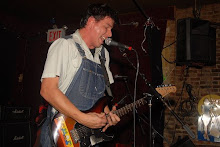BARTOK: From The Fields To The Concert Hall
A live concert interspersing his compositions
with the inspirational sources,
including Bartok's own recordings
of Roma Musicians

Having always felt intimate with Bartok's as well as gypsy music of the roma, I've thoroughly enjoyed playing this recording, loud. It helps to have recently read "Bury Me Standing"- comes from the saying, 'Bury me standing, I've been on my knees all my life'.
"We have music, and if somebody doesn’t have music, then they’re nothing."
-Šelja Bajrami, Plemetina
"The acclaimed Takacs String Quartet joins the Hungarian folk ensemble Muzsikas (with singer Marta Sebestyen, whose inimitable voice you may recall haunting the soundtrack to "The English Patient") to celebrate Hungarian composer Bela Bartok...
When the members of the Takacs Quartet and Muzsikas combine for a concert, they delight in making clear the connections between Bartok's own music and his folk-music obsessions. For example, they alternate movements from some of Bartok's best-known pieces (Romanian Folk Dances, String Quartet No. 4) with the real village dances he collected in the field — both the actual old scratchy records and their own live versions thereof..."
The rest of the source material is on
http://www.npr.org/templates/story/story.php?storyId=103733863
May 6 2009
Jordan Hall, in Boston
Takacs String Quartet
Muzsikas with Marta Sebestyen
Bela Bartok's field recordings
CONCERT PROGRAM
Bartok: Violin Duos (with source tunes)
Track 01
- Torontal Dances (Muzsikas)
- "Ardeleana" (historic Bartok field recording)
- Duo No. 44
Track 02
- "Shoe of My Horse" (Marta Sebestyen)
- Duo No. 28
- Duo No. 32
- "Jocul Barbatesc" (Marta Sebestyen)
Track 03
Bartok: Sonatina (with traditional tunes)
- Bagpipes (Takacs Qt.)
- Bear Dance (Takacs Qt.)
- Bear Dance from Gyimes (Muzsikas)
Track 04
Traditional: Ballad of the Murdered Shepherd
Track 05
Bartok: Romanian Folk Dances (with source tunes)
- Bota es Invertita (Muzsikas)
- Stick Dance (Takacs Qt.)
- Waistband Dance (Takacs Qt.)
- "Pe Loc" (Muzsikas)
- Hornpipe Dance (Takacs Qt.)
- Romanian Polka (Takacs Qt.)
from NPR internet radio, rec. @256 kbps
Enjoy, spread far and wide, and please attend these performers' events when they're in town!






























